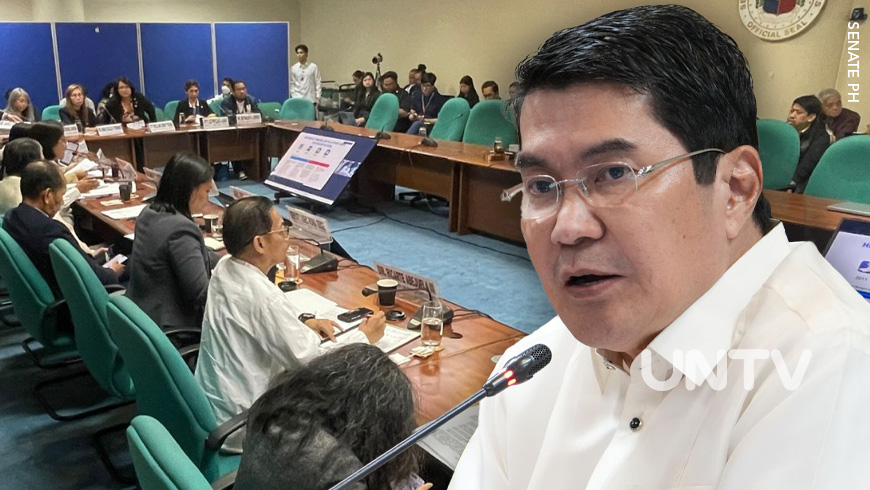Emergency Hotline:
(+63) 2 911 – 8688

SAN JUAN—The FilOil EcoOil Centre erupted yesterday as UNTV Volleyball League (UVL) Season 4 officially launched, transforming government frontliners into high-powered athletes for a cause.
Far more than a trophy race, the UVL continues its "Sports and Charity" mission, where every competition translates into a charitable aid.
This year, P1 million in charitable funding is on the line, with teams competing exclusively to give help to their chosen beneficiaries.
A total of ten formidable teams have entered the arena this year, showcasing a mix of seasoned veterans and hungry newcomers. The participating agencies are:
During the ceremony, UNTV Volleyball League Commissioner Ronnie Magsanoc delivered a resonant message centered on empowerment and inclusivity.
He emphasized that the league serves as a vital platform for showcasing the talent and strength of women in the government workforce.
"Sa lahat ng kababaihan na kabilang ng UNTV Volleyball League, ito po ay isang pagtaas ng watawat ng kababaihan for equal rights," Magsanoc stated.
His remarks underscored the league's commitment to gender equality, framing every spike and serve as a symbolic win for women’s representation in the sporting world.
The opening day set a high bar for the season, fueled by the vision of BMPI CEO Daniel Razon to provide a stage where government employees can excel outside the office.
With the championship prize destined for charity, the stakes remain incredibly high for the 10 competing squads.
As the tournament progresses, fans can expect intense action and professional-level play from these public servants, all while they uphold the league’s core value: that the true victory lies in helping those in need.
Stay tuned and follow UNTV News and Rescue and UNTV Sports social media pages for more updates about UNTV Volleyball League Season 4.


SAN JUAN – The PNP Lady Patrollers showed their championship is still strong, surviving a grueling five-set clash against the AFP Lady Gunnar, 3-2, to kick off UVL Season 4 on Sunday at the FilOil EcoOil Centre in San Juan.
In a back-and-forth match that lived up to the hype, the Lady Patrollers displayed superior late-game composure to withstand the Lady Gunnar’s relentless offense.
After trading sets through the first four frames, PNP turned up the heat in the decider, relying on disciplined defense and timely transition plays to secure the 15-10 clincher and claim the first big win of the season.
Best player of the game was Patrolwoman and PNP Lady Patrollers’ outside hitter Yam Porio, who scored 17 points on 16 attacks with 1 ace.
“Huwag po namin isipin na defending champion kami at isipin pa rin po namin na kami’y mga challenger pa rin po,” Porio said in a post-game interview.
The high-stakes atmosphere in San Juan saw both powerhouse teams struggle for momentum, with the Lady Gunnar taking the second and third sets to put the defending champs on the ropes.
However, the Lady Patrollers refused to back down, dominating the fourth set, 25-17, to force the tiebreaker.
Set scores highlighted the neck-and-neck rivalry: 25-23, 22-25, 21-25, 25-17, and 15-10.
This victory sets a strong tone for the PNP as they begin their campaign for another title in the league dedicated to sports and charity.


SAN JUAN – The BFP Lady Firefighters enter the new UNTV Volleyball League (UVL) carrying the weight of last year’s championship loss. After falling to the PNP Lady Patrollers in the Season 3 finals, the sting of defeat still lingers.
“Minumulto pa rin kami ng championship last year,” admitted Gang Abellana, recalling the emotional challenge the squad faces as they return to the court.
Despite the haunting memories of the past, the Lady Firefighters are channeling that emotion into a singular, focused drive for the upcoming season.
Abellana made it clear that while the roster or the strategies might evolve, the ultimate objective remains unchanged.
When asked about the team’s outlook, she firmly stated that their eyes remain fixed on the gold:
“I think the goal pa rin po is still the same… to win the championship.” Abellana added.
With a mix of seasoned hunger and a desire for redemption, the BFP squad is prepared to turn their past heartbreak into the fuel needed to finally claim the title in the UNTV Volleyball League.


PASAY CITY – The Senate Committee on Science and Technology, chaired by Senator Bam Aquino, launched a critical inquiry on Wednesday, February 18, to safeguard the Philippines' ₱2-trillion IT-BPM industry from the disruptive impact of artificial intelligence (AI) and escalating cyber threats.
With 1.9 million Filipino jobs potentially affected, the hearing on Senate Resolution No. 253 brought together industry leaders and policy experts to address a widening gap in digital safeguards.
Lawmakers warned that despite the sector's record-breaking $40 billion revenue in 2025, the country’s global competitiveness remains hampered by uncoordinated cyber defense systems and the urgent need for an AI-ready workforce.
The high-stakes discussion focused on turning these technological challenges into growth opportunities by aligning national education and labor programs with emerging digital standards.
Senator Aquino emphasized that the inquiry aims to craft "future-proof" legislation to ensure Filipino workers are not displaced by automation but are instead equipped to take on higher-value roles.
By strengthening cybersecurity infrastructure and institutional capacity, the committee seeks to reinforce the Philippines' position as a premier global services hub and ensures the IT-BPM industry remains a resilient pillar of the national economy through 2026 and beyond.


PASAY CITY – The Senate Committee on Foreign Relations moved into high gear Thursday, February 19, as it began deliberations on three key international treaties designed to enhance the Philippines' global standing.
Committee Chairperson Sen. Erwin Tulfo led the session, questioning experts from the DFA, DOJ, and DepEd to ensure the agreements align with national interests.
The hearing focused on standardizing diplomatic cooperation, moving beyond formalities to establish concrete frameworks in education, fiscal policy, and legal repatriation.
Central to the discussion are three transformative deals: the Tokyo Convention, which aims to streamline the recognition of higher education degrees across the Asia-Pacific; a Double Taxation Agreement with Cambodia to ease financial burden on cross-border trade; and a crucial treaty with the United Kingdom on the Transfer of Sentenced Persons (TTSP).
The UK pact would allow Filipinos convicted abroad to serve the remainder of their sentences closer to home. By involving stakeholders from the academe to legal experts, the panel signaled its intent to finalize these agreements and strengthen the country’s bilateral and regional ties.